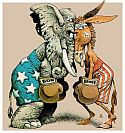This entry is part of a series. For a listing of all entries in the series, go to the Index. Unless otherwise noted, all Bible quotations are from the New Revised Standard Version (NRSV).
 Today marks a mini milestone in this series - it's 1 year anniversary. My first post, Friday Bible Blogging - Introduction and Picking a Translation was posted on October 12th, 2012. Today is October 11th, 2013 - just one day short of a full year. I've covered 397 verses as of today, which is a bit short of my original goal of averaging 10 verses per week, but not too bad. At least I've stuck with it and stayed pretty consistent.
Today marks a mini milestone in this series - it's 1 year anniversary. My first post, Friday Bible Blogging - Introduction and Picking a Translation was posted on October 12th, 2012. Today is October 11th, 2013 - just one day short of a full year. I've covered 397 verses as of today, which is a bit short of my original goal of averaging 10 verses per week, but not too bad. At least I've stuck with it and stayed pretty consistent.
Chapters 21 through 30 of 2 Chronicles continue on with the narrative. Like I wrote last week, it's now a little more than just a summary of what was in Kings. At least there's a bit of new information, but it's still largely repetitious and subsequently a bit boring.
2 Chronicles, Chapter 21
Jehoshaphat's story was pretty much finished in the previous chapter, but the first verse of this chapter was where it was finally noted that he died. His son Jehoram succeeded him. Jehoram was a bad king, "He walked in the way of the kings of Israel, as the house of Ahab had done; for the daughter of Ahab was his wife. He did what was evil in the sight of the Lord." He'd even killed all his brothers and a few court officials when he took the throne to eliminate any chance of competition. And actually, while Jehoram was presented as a bad king in Kings, he's presented even worse here. Interestingly, Elisha was left out of the account in Chronicles.
This chapter was basically a detailed accounting of Jehoram's transgressions, and the ways he was punished for it. This included Edom revolting, being invaded by Philistines, Arabs, and Ethiopians (or Cushites), and a rather unpleasant bowl disease, "After all this the Lord struck him in his bowels with an incurable disease. In course of time, at the end of two years, his bowels came out because of the disease, and he died in great agony."
When Jehoram died, the people didn't honor him at all, "He departed with no one's regret."
An interesting aspect from this chapter was that Elijah delivered a prophecy to Jehoram through a letter. Prophecies had always been spoken in Kings. According to the New Oxford Annotated Bible (NOAB), it "reflects the increasing significance of a written book-culture in the Chronicler's time".
2 Chronicles, Chapter 22
Following Jehoram's death, his son Ahaziah ruled briefly - about a year. He was also a bad king, but was assassinated by Jehu before he could do too many terrible things. Somewhat brutally, the reason for Ahaziah's death was because Jehu " was executing judgement on the house of Ahab". In other words, he was killed not for his own sins, but those of his grandfather. But since his other grandfather was the noble Jehoshaphat, he was at least given a proper burial.
In the end of the chapter, Ahaziah's mother, Athalia, took the throne. Just like in Kings, she was presented negatively, attempting to kill all of David's descendants. But her sister, Jehoshabeath, managed to save one boy, Joash, keeping David's line from being completely eradicated.
2 Chronicles, Chapter 23
Chapter 23 covered the retelling of the story of a group of loyalists led by the priest, Jehoida, revolting against Athalia, bringing Joash to power (who was still just a boy), and killing Athaliah. Jehoida renewed the covenant between the people and the Lord, and all of the non-Jewish religious paraphernalia was torn down and destroyed, along with killing the priest of Baal, Mattan.
If I stop and try to envision all this as real, it really does seem quite tumultuous and barbaric. Just imagine if a group of evangelical Christians took over the government in this country, and went around destroying every church & temple that wasn't their particular religion and killing all those priests - Jehovah's Witnesses, Mormons, Catholics, Muslims, Jews, Hindus, etc. Calling it unnecessarily violent is an understatement. But, unfortunately, this story doesn't sound unrealistic - I can easily imagine an episode like this happening in ancient Judah.
2 Chronicles, Chapter 24
Chapter 24 covered the actual reign of Joash. Following the Chronicler's more typical motif, Joash began as a good king, and then later in his reign abandoned the Lord. The first part of his reign, when he was still good, was under the influence of the priest, Jehoiada. He had the temple repaired along with its furnishings.
But once Jehoiada died, "They abandoned the house of the Lord, the God of their ancestors, and served the sacred poles and the idols." God sent prophets to try to bring them back to faithfulness, but they wouldn't listen. Gode even "took possession of Zechariah son of the priest Jehoiada", and used him to deliver a speech, but Joash had Zechariah killed.
Because of Joash and Judah's unfaithfulness, The army of Aram invaded and Joash was wounded. While he lay recovering on his bed, he was killed by his servants in revenge for the death of Zechariah.
2 Chronicles, Chapter 25
Amaziah was next in line. His story was similar - starting off good, then turning to other gods. After first killing the murderers of his father, he assembled a force to attack Seir. He had actually hired warriors from Israel, but "a man of God came to him and said, 'O king, do not let the army of Israel go with you, for the Lord is not with Israel...' " I find this interesting on two fronts - first that God's chosen people were so thoroughly abandoned and disdained by God. I suspect this is the Chronicler's prejudice against Israel. The other was the idea that I discussed last week, that God doesn't want people trying their best to use Earthly means to accomplish what needs to be done, but to instead rely solely on faith.
After defeating Seir, Amaziah brought back their gods and set them up to worship them. This really is unbelievable as presented here. After just having won a battle thanks to the Lord's support, why would Amaziah immediately abandon the Lord for these new gods?
As punishment, Judah was defeated by Israel in battle, Jerusalem was plundered, and Ahaziah was captured, but he wasn't killed. And here I lose the story a bit, but it appears that Ahaziah must have been released by the king of Israel. However, there was still a group in Jerusalem faithful to God. Amaziah fled to Lachish, but they tracked him down and killed him.
2 Chronicles, Chapter 26
With Amaziah dead, his son Uzziah was made king. His coverage was more extensive here than it was in Kings, and the NOAB noted that while some of it may have come from other sources, some of it was probably created by the Chronicler.
His reign followed the same motif of going from good to bad, but his bad aspect wasn't really all that bad. In the first part of his reign, he was victorious in wars with various neighbors of Judah, including the Philistines. He established new cities in some of the conquered territory. He built cisterns and other public works, and just in general had a good reign.
However, "when he had become strong he grew proud, to his destruction." He went into the temple and tried to "to make offering on the altar of incense". But he wasn't a priest, so it wasn't his place to do so. He was struck with a leprous disease on his forehead. "King Uzziah was leprous to the day of his death, and being leprous lived in a separate house, for he was excluded from the house of the Lord." Because of his exile, his son Jotham ruled in his place, and then assumed the throne once Uzziah died.
2 Chronicles, Chapter 27
Jotham received very short coverage. Chapter 27 is only 9 verses long. He had a good reign, continuing on in his father's tradition, minus the ill-fated attempt at being a priest. There's not even any mention of him turning away from the Lord.
2 Chronicles, Chapter 28
Ahaz became king after Jotham died. His reign started off bad:
he walked in the ways of the kings of Israel. He even made cast images for the Baals; 3and he made offerings in the valley of the son of Hinnom, and made his sons pass through fire, according to the abominable practices of the nations whom the Lord drove out before the people of Israel. 4He sacrificed and made offerings on the high places, on the hills, and under every green tree.
Note that 'passing through fire' may be a reference to human sacrifice.
Most of the chapter was a detailing of military defeats Judah suffered because of Ahaz. One of these defeats was to Israel, who took many Judeans captive. However, the Lord sent a prophet, Obed, to tell the Israelites not to make slaves of the Judeans, and so the captives were released. This is odd. Look back to Chapter 25, and God's attitude toward Israel. But here he is in this chapter giving them victory over Judah (albeit, mostly because of Judah's sins), and sending a prophet to speak to them directly. And the Israelites actually listened to the prophet, so apparently they hadn't completely abandoned their faith in the Lord.
This also drives home something I haven't discussed as much recently - collective punishment. All of Judah was being punished for Ahaz's crimes.
2 Chronicles, Chapter 29
After Ahaz died, Hezekiah became king, and he received fairly extensive coverage in Chronicles - four chapters worth. The focus was different than Kings. While the earlier book focused on the invasion by Sennacherib, this book focused more on the restoration of the temple and religious practices. Like his coverage of Uzziah, the Chronicler appears to have invented some details in this story.
Chapter 29 was mostly about re-opening and repairing the temple, re-instituting the priests and Levites, restoring all the furnishings, etc. Of course, there were the requisite sacrifices, "seven bulls, seven rams, seven lambs, and seven male goats for a sin-offering" to sanctify the altar, and "seventy bulls, one hundred rams, and two hundred lambs" for burnt offerings, along with " six hundred bulls and three thousand sheep" for consecration offerings. It must have been a bloody affair.
2 Chronicles, Chapter 30
Chapter 30 contained the story of Hezekiah re-instituting the Passover celebration. Apparently, there hadn't been a large scale Passover since the time of David and Solomon. Hezekiah sent letters to all of Judah and Israel, but only a handful of Israelites joined the festival. The use of letters is again noteworthy, signaling the importance of the written word to the Chronicler. And again, there were more sacrifices and dashing of blood.
There was a passage here that seemed out of character for the vengeful God I've become used to. Many of the people hadn't cleansed themselves properly before eating the Passover meal. In previous books, I'd expect a harsh punishment from God for not following proper protocol, but here he didn't seem to be too mad. "But Hezekiah prayed for them, saying, 'The good Lord pardon all who set their hearts to seek God, the Lord the God of their ancestors, even though not in accordance with the sanctuary's rules of cleanness.' The Lord heard Hezekiah, and healed the people."
Another interesting passage was how Hezekiah used letters to spread word of the Passover celebration, again showing the importance of the written word to the Chronicler. The NOAB had an interesting footnote on this, "The distribution of royal declarations by missives was common in the Persian period. The Persian empire was renowned for its international postal system."
---
I don't have any particularly new thoughts to add here that I haven't already written about Chronicles. I can say that I'm actually a little excited that next week is my last Chronicles entry. I'll be done with it, and can finally move on to something new and hopefully a little more interesting.
New Revised Standard Version Bible, copyright 1989, Division of Christian Education of the National Council of the Churches of Christ in the United States of America. Used by permission. All rights reserved.
 If you follow this type of thing, you may have heard that the Red Bull Air Races are back (Wired - Crazy Red Bull Air Races Returning to the Skies in 2014). If you don't follow this type of thing, then here's a very brief background - the Red Bull Air Races consist of pilots flying light aerobatic planes through a series of pylons, at altitudes of less than 100 feet, doing some pretty amazing maneuvers to keep on course.
If you follow this type of thing, you may have heard that the Red Bull Air Races are back (Wired - Crazy Red Bull Air Races Returning to the Skies in 2014). If you don't follow this type of thing, then here's a very brief background - the Red Bull Air Races consist of pilots flying light aerobatic planes through a series of pylons, at altitudes of less than 100 feet, doing some pretty amazing maneuvers to keep on course.





 Chapters 1 through 10 constitute the entirety of Ezra. However, Ezra was originally part of a larger book - Ezra-Nehemia, combined with, as is obvious from the name, Nehemia (which immediately follows it in the Bible). These were about repopulating and rebuilding Judah after the Babylonian exile. However, as the New Oxford Annotated Bible (NOAB) points out, it's difficult to figure out the chronology just from Ezra-Nehemiah as it's not very clear. In fact, there are multiple anachronisms throughout the book, and its depiction of events contrasts with the books of Haggai and Zechariah (I'm not going to point out the anachronisms and conflicts in my review, but you can read a bit more about them
Chapters 1 through 10 constitute the entirety of Ezra. However, Ezra was originally part of a larger book - Ezra-Nehemia, combined with, as is obvious from the name, Nehemia (which immediately follows it in the Bible). These were about repopulating and rebuilding Judah after the Babylonian exile. However, as the New Oxford Annotated Bible (NOAB) points out, it's difficult to figure out the chronology just from Ezra-Nehemiah as it's not very clear. In fact, there are multiple anachronisms throughout the book, and its depiction of events contrasts with the books of Haggai and Zechariah (I'm not going to point out the anachronisms and conflicts in my review, but you can read a bit more about them  As has become my yearly tradition, every October I take some time to examine the books I've read over the past year (see previous reviews for
As has become my yearly tradition, every October I take some time to examine the books I've read over the past year (see previous reviews for  Today is traditionally celebrated as Columbus Day, but Columbus really was a horrible excuse for a human being. It's not just the myth about him proving the world was round, or lucking into finding a continent that nobody knew existed, but his horrible, horrible treatment of the natives and even the Spaniards in the first Spanish colony in the Americas.
Today is traditionally celebrated as Columbus Day, but Columbus really was a horrible excuse for a human being. It's not just the myth about him proving the world was round, or lucking into finding a continent that nobody knew existed, but his horrible, horrible treatment of the natives and even the Spaniards in the first Spanish colony in the Americas.
 I've written about my political affiliation
I've written about my political affiliation 
 I've never been a huge sports fan. I'm not oblivious to sports, but for the most part, I don't make it a point to watch them. I have gone through a few periods where I'll follow a particular sport for a little while, but none of those periods has lasted long term. When I was in middle school, it was hockey, back when Lindros was just getting started in Philly (when
I've never been a huge sports fan. I'm not oblivious to sports, but for the most part, I don't make it a point to watch them. I have gone through a few periods where I'll follow a particular sport for a little while, but none of those periods has lasted long term. When I was in middle school, it was hockey, back when Lindros was just getting started in Philly (when  It's time for my monthly routine of looking over the server logs to see how things have been going on this site. The trend from last month has continued, with overall traffic increasing even more. By all measures except one (bandwidth), September 2013 was the busiest month ever for my website, and by a large margin in most cases. For example, page views were up 39% from last month, and 253% from the next highest month. And even bandwidth was just barely lower than it was for the highest month - 99.2%. I suspect this has to do with increased spammers, but I hope it's also due to more legitimate traffic.
It's time for my monthly routine of looking over the server logs to see how things have been going on this site. The trend from last month has continued, with overall traffic increasing even more. By all measures except one (bandwidth), September 2013 was the busiest month ever for my website, and by a large margin in most cases. For example, page views were up 39% from last month, and 253% from the next highest month. And even bandwidth was just barely lower than it was for the highest month - 99.2%. I suspect this has to do with increased spammers, but I hope it's also due to more legitimate traffic.